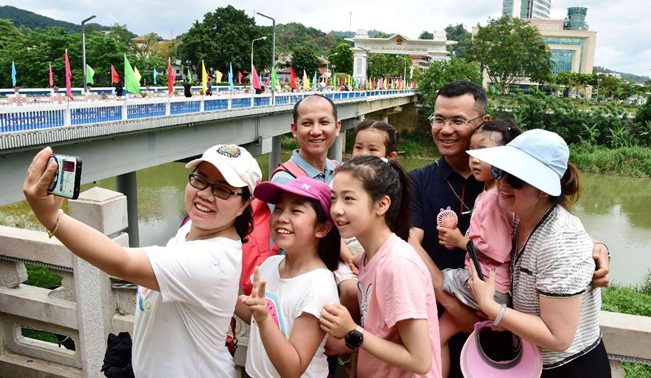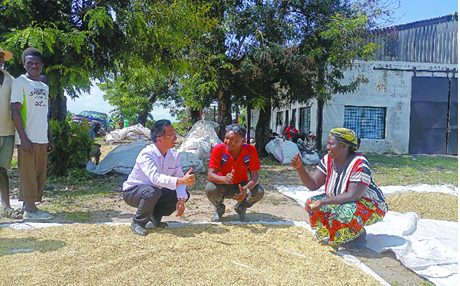
By Cui Ru
On Tuesday, March 5, 2024, the National People’s Congress (NPC), China’s legislature, convened for its opening meeting of the annual Two Sessions. In the meeting, Premier Li Qiang delivered the 2024 Government Work Report, setting forth the year’s economic agenda. The report, a crucial policy blueprint for the coming year, detailed various initiatives including innovative fiscal policies, attracting foreign investment, expanding consumption, and enhancing green development strategies. This marks a pivotal moment in China’s commitment to a sustainable and inclusive growth trajectory.
China’s 2024 Government Work Report highlights significant economic and social progress made in 2023, with a GDP growth of 5.2%, making it one of the fastest-growing major economies. The country achieved a commendable feat in job creation and maintained a stable urban unemployment rate and consumer prices. Looking ahead to 2024, China targets around 5% economic growth and plans to create over 12 million urban jobs. The country is also set to issue ultra-long special treasury bonds and lift foreign investment restrictions in manufacturing and service sectors. Furthermore, China will focus on modernizing its industrial system and fostering new productive forces, including hydrogen power, biomanufacturing, and AI. Commitments to ensuring stable agricultural production, promoting green development, and advancing the energy revolution also form key parts of the agenda, as the nation continues to prioritize ecological conservation and carbon neutrality goals.
The Two Sessions, integrating the NPC and the National Committee of the Chinese People’s Political Consultative Conference (CPPCC), assembled nearly 3000 delegates representing a cross-section of China’s multifaceted society. These sessions play a vital role in shaping China’s policy landscape, their outcomes resonating far beyond the nation’s borders, impacting global economic patterns and geopolitical shifts.
Central to this year’s discussions was the concept of Chinese-style modernization, a theme that resonated throughout the sessions. This approach uniquely combines China’s rich cultural heritage, especially its Confucian values and traditional arts, with modern innovation, carving a distinctive path in the global development narrative. The delegates’ focus on integrating these elements into contemporary development strategies highlighted a progressive yet rooted approach to national advancement.
Technological innovation, a key focus area, saw China positioning itself at the forefront of the Fourth Industrial Revolution. Discussions underscored advancing sectors such as artificial intelligence and renewable energy, showcasing China’s intention to harness technology as a catalyst for social and economic progress.
Sustainable development, a mainstay of policy deliberations, mirrored China’s vision for an ecological civilization. Strategies to enhance energy efficiency, reduce carbon emissions, and adopt sustainable technologies were debated, underlining a commitment to an environmentally sustainable growth model.
Social harmony and inclusive growth were also focal points, addressing challenges like bridging the urban-rural divide and ensuring equitable access to critical services like education and healthcare. These conversations underscored China’s aspiration for a society where progress is balanced and inclusive, integral to its modernization process.
Global engagement and cooperation received significant attention, with China reaffirming its commitment to initiatives such as the Belt and Road Initiative. This emphasized China’s ambition to play a leadership role in fostering global collaboration and shared prosperity, redefining its position on the world stage.
In conclusion, the 2024 Two Sessions marked a significant stride in China’s journey towards an innovative form of modernization, aligning with its aspirations for global partnership and leadership. This blending of traditional values with technological innovation, paired with aligning domestic ambitions with global responsibilities, reinforces China’s role as a key player in global affairs. These sessions provide a comprehensive insight into China’s evolving policy direction, highlighting strategies to address both national and global challenges and aspirations, painting a future where China continues to be a pivotal force in shaping the global narrative.
China’s Two Sessions also attracted the attention of Pakistani experts.
Zamir Awan can speak fluent Mandarin. He has served as a Counsellor for Science and Education at the Pakistani Embassy in China and has experienced the National People’s Congress and Chinese People’s Political Consultative Conference multiple times during his time in China. He stated that the two sessions are a key agenda on China’s political calendar, and through continuous attention to them, people can understand the characteristics of Chinese politics and its global influence.The “the Belt and Road” and the China Pakistan Economic Corridor symbolize China’s vision of achieving inclusive and sustainable development in the world.
As an analyst ,Yasir Habib Khan said,China’s greater efforts to stabilize growth, nurture new growth drivers and open up wider to the outside world will offer tremendous opportunities for other countries.
(By Cui Ru, Journalist from china Media Group)











